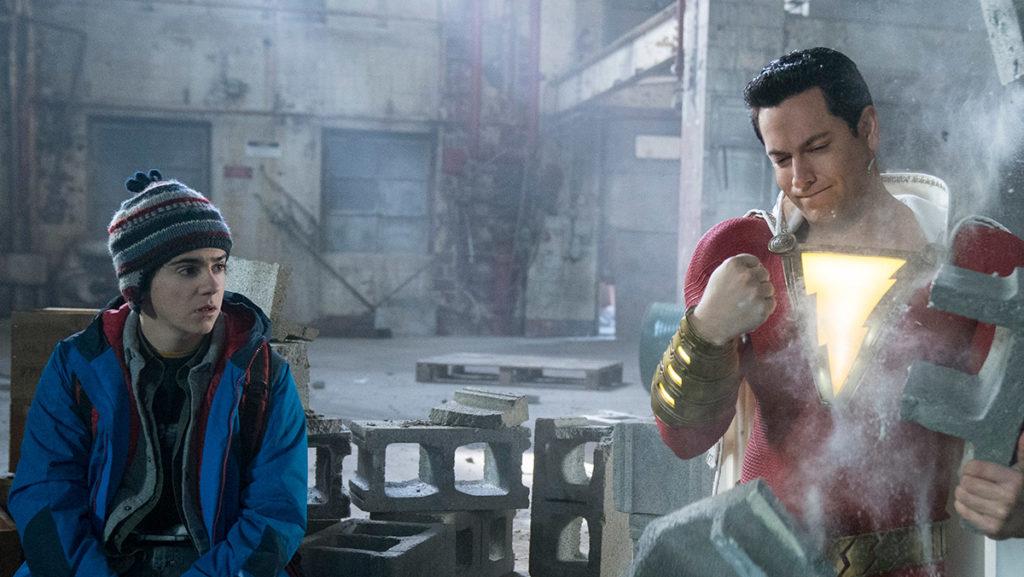With the wisdom of Solomon, the strength of Hercules, the stamina of Atlas, the power of Zeus, the courage of Achilles and the speed of Mercury, “Shazam!” is one of DC’s best big screen adaptations in the past six years.
After DC saw major box office success last December with “Aquaman,” “Shazam!” is DC’s second attempt to correct past mistakes. Coming off the back of repeated failures with films like “Batman vs. Superman: Dawn of Justice,” “Suicide Squad” and “Justice League,” DC is trying to take a step back by making character-focused solo films rather than attempting to craft a cinematic universe. “Shazam!” is an emotionally resonant story with characters whose personalities mirror their comic book counterparts.
“Shazam!” tells the tragic tale of Billy Batson (Asher Angel), a 14-year-old boy who was left behind by his single mother when he was a child. Billy has spent his life bouncing between Philadelphia foster homes as he searches for his long-lost mother. Everything changes when a mysterious wizard (Djimon Hounsou) seeks Billy out and determines that Billy is pure-of-heart, a trait that makes him worthy of harnessing the wizard’s powers to transform into the superhero Shazam (Zachary Levi). When Billy transforms into Shazam, he becomes an adult version of himself that also has superpowers, adding to the humor of the story. Billy then teams up with his foster brother Freddy Freeman (Jack Dylan Grazer), and the two explore the extent of Billy’s newfound powers. Things take a turn for the worse when Dr. Thaddeus Sivana (Mark Strong) acquires the powers of the villainous Seven Deadly Sins and goes after Billy.
Like many superhero origin stories, this film finds its strengths in its protagonists. Billy’s tragic backstory makes him an empathetic character whose sassy and overaggressive attitude makes sense. That being said, the film gets off to a rather slow start as it follows Billy around Philadelphia searching for his mother. The story picks up dramatically when Billy is introduced to his foster family and meets Freddy. Freddy offers a humorous, light-hearted attitude that directly contrasts Billy’s. Freddy is a huge fan of superheroes, meaning he has knowledge that becomes relevant when Billy transforms into Shazam. Freddy’s love for superheroes stems from a disability in his leg that limits his movements. His character is partially built on him feeling like because of his disability he can never be as strong of a person as Superman or Batman. His disability is not overblown and adds a layer to his motivation behind helping Billy master his abilities as Shazam. The scenes where Freddy tries to uncover all of Shazam’s superpowers are hilarious and help create an emotional relationship between Billy and Freddy that carries the film forward. This relationship also becomes complicated when the disabled Freddy starts to believe that Billy is undeserving of the powers he’s been given.
It’s impressive that the relationship between the two foster brothers is emotionally resonant considering Billy is portrayed by two actors. Angel plays the younger version of Billy and Levi portrays him when he transforms into Shazam, but the transition between the two flawlessly feels like the same character. Levi manages to capture the spirit of an adolescent in a way that is adorable and charming, never feeling annoying or overblown. Not only are the three lead actors phenomenal, but the supporting cast manages to convince the viewer that Billy’s family really does care about him. Billy’s foster parents, Rosa (Marta Milans) and Victor (Cooper Andrews), are two of the most loveable people imaginable. Milans and Andrews encapsulate a pureness of character that doesn’t feel cheap or unrealistic. When Billy disappears mysteriously, Rosa and Victor remain understanding of his struggle, acting as a good example for Billy’s nonlinear moral compass.
“Shazam!” has a lot of the elements that were missing in previous DC films, like real emotional weight and empathetic characters. Despite its strengths, this film drops the ball in its finale. The lack of quality in the third act comes from the deeper addition of side characters like Dr. Sivana and Billy’s family. Dr. Sivana begins the film as a sinister businessman with malicious goals, but the film concludes with Dr. Sivana as a mindless host for the Seven Deadly Sins to control at their will. Along with that, the film’s message about protecting family values is effective throughout, but in the third act, it attempts to use Billy’s foster family to scale up the conflict in a way that feels cheap. Billy’s family did their job supporting him emotionally and offering comedic charm to the film, but when they become directly involved in the final set-piece as a way to enhance the emotional weight of the situation, it seems like a bizarre inclusion. The family is thrust into the middle of the action, seemingly showing up out of nowhere. This sudden addition detracts from the previous hour and a half of character development that leads up to it.
Even though “Shazam!” isn’t a perfect film, it’s undeniably a step in the right direction for DC. It’s nice to see DC giving a director like David F. Sandberg the liberty to make a movie with a sense of intention behind it. Like “Aquaman” and “Wonder Woman,” “Shazam!” is a fun ride that doesn’t quite stick the landing in its finale but still conveys a message that resonates.




















